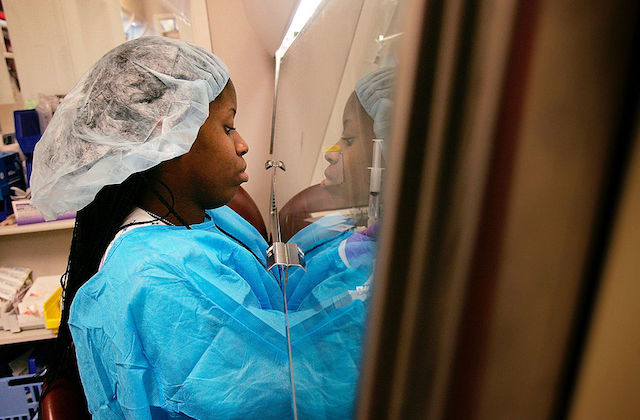The American Cancer Society estimates that approximately 57,000 people will be diagnosed with endometrial cancer this year. Annually, about 11,000 people die from the disease—which targets the uterine lining and is the most common gynecological cancer in the United States—and Black women are 55 percent more likely to die than their White counterparts.
“Within every age, within every stage of diagnosis, within every tumor type, Black women do worse,” Dr. Kemi Doll, a gynecologic oncologist at the University of Washington, told Mother Jones in an October 21 piece on the racial disparities surrounding mortality.
Reports Mother Jones:
rnt
[Doll] believes that, as with racial discrepancies in other medical conditions, the difference in the endometrial cancer death rate is the result of how the medical establishment treats Black women.
t
To start, Black women are less likely than White women to receive an early diagnosis for the disease. As a result, thousands discover they have the cancer only after it has spread, when they have less chance of survival.
“If you consider a Black woman in the U.S. who has had a lifetime of experiences of subpar reproductive health care, it might not be that a couple of drops of postmenopausal bleeding has you running to the doctor,” Doll said, explaining why poor patient care can lead to some not immediately seeking medical help.
Studies support Doll’s hypothesis. One, published in March, concluded that Black women are less likely to get biopsies that could help with early detection, whether or not they have health insurance or access to adequate medical care. A 2017 study found that Black women are also less likely to receive surgery or chemotherapy than White women at every stage of the cancer.
Endometrial cancer is not the only illness for which Black women have disproportionately higher mortality numbers. Mother Jones reports higher rates of death in Black patients compared to White ones for breast and stomach cancers, along with a higher likelihood for having a stroke or developing Alzheimer’s disease. As Colorlines has previously reported, in the months surrounding childbirth, African-American mothers die at three to four times the rate of White mothers.
“You can either approach it from the standpoint that there is something fundamentally wrong with Black women’s bodies, or there’s something wrong with the way we treat Black women and their bodies,” Doll says. “We are not going to help women, and we are not going to solve this problem, if we don’t deal with the problem of race and racism.”
